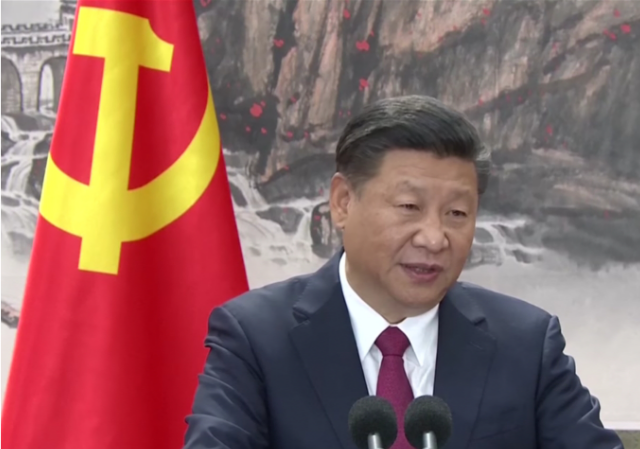
U.S. Treasury blacklists seven Chinese officials under Trump-era Hong Kong Autonomy Act.
Communist China threatened to deal a “head-on blow” to the United States over the latest sanctions imposed by President Joe Biden’s administration on Chinese officials involved in the crushing of pro-democracy movement in Hong Kong.
The measure taken by the Biden White House this week “shows the Chinese people and the people of the world the ugly face of US hegemony and power politics,” the Hong Kong-based Chinese liaison office lashed out.
The Biden administration blacklisted seven Chinese officials over violations of the Hong Kong Autonomy Act, a bill signed into law by former President Donald Trump in July 2020. President Trump ended the special economic status granted to Hong Kong in response to China’s drive to erode the territory’s autonomy guaranteed by the Communist regime under the “one country, two systems” policy when it took control of the territory in 1997.
Besides sanctions, the Biden White House also issued an advisory to U.S. companies doing business in Hong Kong as Beijing overrides the territory’s liberal economic policies owed to the 156 years of benevolent British rule.
On Saturday, The Associated Press reported the measures taken by the Biden White House:
The Biden administration issued a blanket warning Friday to U.S. firms about the risks of doing business in Hong Kong as China continues to clamp down on political and economic freedoms in the territory.
Four Cabinet agencies — the departments of State, Treasury, Commerce and Homeland Security — released the nine-page advisory that alerts companies about the shifting legal landscape in Hong Kong and the possibility that engaging with Hong Kong business could incur reputational and legal damages.
At the same time, Treasury announced sanctions against seven Chinese officials for violating the terms of the 2020 Hong Kong Autonomy Act, which calls for asset freezes and other penalties against those who participate in the crackdown.
President Joe Biden had previewed the new advisory Thursday, telling reporters at the White House that the business environment in Hong Kong is “deteriorating” and could worsen.
“Businesses, individuals, and other persons, including academic institutions, research service providers, and investors that operate in Hong Kong, or have exposure to sanctioned individuals or entities, should be aware of changes to Hong Kong’s laws and regulations,” said the notice, which is titled “Risks and Considerations for Businesses Operating in Hong Kong.”
By passing sweeping “security” laws to clamp down on Hong Kong’s popular pro-democracy movement, Beijing has reneged on the promises of respecting Hong Kong’s constitution based on Anglo-Saxon law. In the legislations imposed by the Chinese Communist Party (CCP), Beijing can deport anti-regime activists to the mainland and puts them on trial under the Chinese law.
The South China Morning Post reported Beijing’s angry response:
China vowed to deal a “head-on blow” to the United States after it imposed more sanctions on mainland Chinese officials over Hong Kong and warned American companies of the hazards of doing business in the city.
Beijing’s liaison office in Hong Kong slammed Washington on Saturday for its “unprovoked smearing” after it issued an advisory that warned of “clear operational, financial, legal and reputational risks” in the city, including from the national security law and potential retaliation against companies for compliance with US sanctions. It also dismissed the sanctions on seven officials from the office as “blatant provocations”.
“The successive sanctions imposed on us by the US have no meaning, other than to fuel our contempt towards US politicians and to arouse our strong will to fight for our national interests,” it said.
“Anyone who intervenes in Hong Kong’s affairs had best believe that China’s development will firmly continue, and we will deal a head-on blow to America’s unscrupulous behavior.”
The fiery language was echoed in a separate statement from the Chinese foreign ministry’s office in Hong Kong on Saturday. It dismissed the US business advisory as “nonsense”, and defended the national security law as a measure that could “push Hong Kong from chaos to governance”.
“The so-called US sanctions on Chinese officials cannot at all change the Chinese government’s lawful efforts to safeguard national sovereignty, safety and development interests and determination to ensure Hong Kong’s prosperity and stability,” it said. “Instead, it just further shows the Chinese people and the people of the world the ugly face of US hegemony and power politics.”
The threatening language used in the Chinese statement is similar to warning issued by Chinese President Xi Jinping in a recent speech. In a remark likely aimed at the U.S. and the West, Xi threatened that China’s enemies will “have their heads cracked and bleeding” in any future conflict. They “will find themselves on a collision course with a great wall of steel forged by over 1.4 billion Chinese people,” the Communist leader warned in a televised address marking the 100th anniversary of the Chinese Communist Party.
These are not merely empty threats. The remarks come as China is increasing its nuclear arsenal and expanding its military capabilities.
According to the recent findings released by U.S. defense experts, the Maoist regime is building a vast nuclear weapons complex in the desert of north central China. “Spread across more than 700 sq miles, the site near Yumen includes the construction of underground bunkers, which may function as launch centres, cable trenches, roads and a small military base,” researchers from the California-based Middlebury Institute of International Studies revealed earlier this month.
The CCP is pursuing an ambitious plan to modernization of its armed forces and navy by 2027. In terms of ship numbers, Beijing already has the world’s largest navy at its command.
Communist China makes no secret of its hostile intentions. Last October, Xi Jinping told the Chinese armed forces, the People’s Liberation Army, to focus on “preparing for war.”




